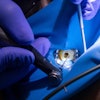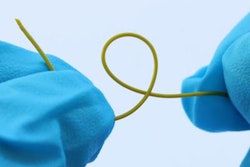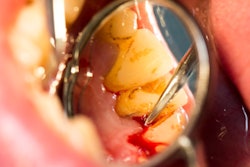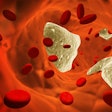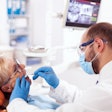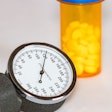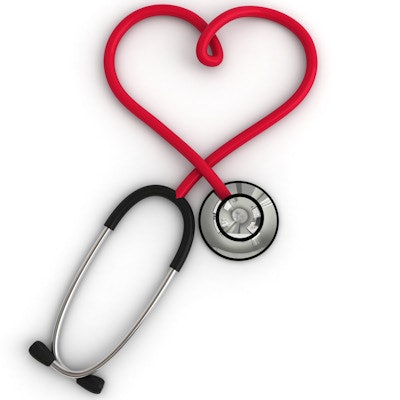
Are you seeing patients with high blood pressure who also have periodontal disease? A large study of more than 3,000 such patients illustrated the effect oral health can have on hypertension treatment.
Patients with high blood pressure taking medication for their condition are more likely to benefit from the therapy if they have good oral health, according to the researchers. Their study was published in the American Heart Association (AHA) journal Hypertension on October 22.
"Dental health professionals should be aware that oral health is indispensable to overall physiological health, including cardiovascular status," stated lead study investigator Davide Pietropaoli, DDS, PhD, of the University of L'Aquila in Italy, in an AHA press release.
Higher blood pressure
Some studies have shown that periodontal therapy has a positive effect on a patient's blood pressure, but the impact of periodontitis on blood pressure control is unknown.
The researchers of the current study retrospectively analyzed cross-sectional representative data of more than 3,600 adults with high blood pressure who were age 30 and older both with and without periodontitis using data from the National Health and Nutrition Examination Surveys (NHANES) from 2009 to 2014. The surveys are conducted by the U.S. Centers for Disease Control and Prevention's National Center for Health Statistics and are designed to provide nationally representative data about the health status of children and adults in the U.S.
“Dental health professionals should be aware that oral health is indispensable to overall physiological health, including cardiovascular status.”
Just under 48% of patients were free of periodontal disease. Most of the remaining patients had moderate periodontal disease (37.8%), followed by severe (11.5%) and mild (2.9%) disease. Compared with those with mild periodontitis, patients with moderate and severe disease tended to be older, men, Hispanic, and smokers and have normal weight, lower income, and lower education.
The target blood pressure range for people with hypertension is less than 130/80 mmHg according to the latest recommendations from the AHA and the American College of Cardiology.
Mean systolic blood pressure was about 2.3 mmHg to 3 mmHg higher in patients with periodontal disease and treated hypertension, compared with those without periodontal disease (133.43 ± 19.7 mmHg versus 131.17 ± 19.5 mmHg; p < 0.0001), the researchers found. While it seems small, the 3 mmHg difference is similar to the reduction in blood pressure that can be achieved by reducing salt intake by 6 grams per day (equal to a teaspoon of salt or 2.4 grams of sodium), they noted in the AHA release. The difference was even greater at 7 mmHg in patients with periodontal disease and untreated hypertension.
In addition, periodontitis was associated with unsuccessful antihypertensive treatment, with odds of unsuccessful treatment rising with disease severity. When patients took blood pressure medication, the gap shrunk to 3 mmHg but was not completely eliminated. Periodontal disease may interfere with the effectiveness of blood pressure treatments, the researchers concluded.
Oral inflammation link
The authors listed several limitations of their study:
- Bleeding on probing was not assessed.
- Information such as hypertension drug classes, number and dose of medications, appropriateness of antihypertensive agents, adherence to therapy, use of antibiotics, or a history of periodontal treatment was not available.
- The analysis of costs/benefits related to periodontal therapy goes beyond the purpose of the present study and deserves specific evaluation in dedicated trials.
While the study was not designed to clarify exactly how periodontal disease interferes with blood pressure treatment, the researchers noted that their results are consistent with previous research that links low-grade oral inflammation with blood vessel damage and cardiovascular risk.
"Patients with high blood pressure and the clinicians who care for them should be aware that good oral health may be just as important in controlling the condition as are several lifestyle interventions known to help control blood pressure, such as a low-salt diet, regular exercise and weight control," Dr. Pietropaoli stated.


